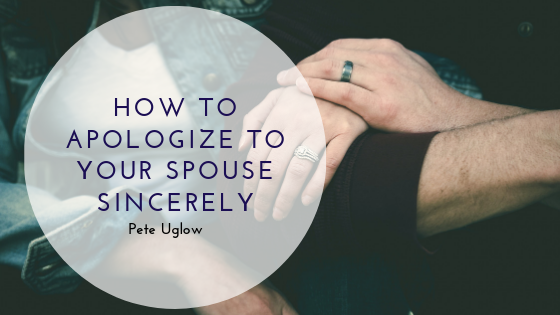Saying “I’m sorry” to our spouses is often incredibly difficult. It can feel like admitting defeat; having to swallow pride and admit wrongdoing takes a certain kind of strength. We have to realize that we’ve really messed up and hurt the person we love most in the world. It’s human to make mistakes though, so it’s bound to happen. But some mistakes are worse than others. In those moments, when our actions inflict pain, it’s important to accept responsibility and apologize.
It’s important to remember that when we hurt someone very deeply, the healing process will take longer. Knowing that forgiveness may not be immediately given, or granted to us at all, is what often holds us back from apologising in the first place. No matter how serious and consequential the mistake, apologising is essential. Here are the steps you need to take to make it sincere.
Forgive Yourself
As backwards as it may sound, apologies need to go both ways in order for them to truly land. Why? For a multitude of reasons, the first of which being the emotional toll it will take on both you and your spouse. Despite its name, self-loathing is emotionally draining to everyone around us. Healing needs positive energy and perspectives to take root. When you’re constantly reminding yourself and your spouse of the mistake you made, the mistake gets all of the attention, and the healing comes second.
By forgiving yourself, you’re not shunning accountability or clearing yourself of wrong doing. Remember that. You’re still guilty of causing pain. Instead, forgiving yourself allows you to acknowledge that a mistake doesn’t define you or mean you’re a bad person. What it gives you is the opportunity to change and grow.
Apologise Correctly
The right time to apologise will never come, but sooner than later is always better. Hurt compounds and grows when steps are not taken to address it. When we’ve caused our spouse pain or suffering, accepting responsibility quickly and taking the steps to right it should be done quickly. However, if we are too upset to apologise immediately after the fact, we should allow ourselves time to cool down, but not too much time.
For the apology itself, what we say matters, but how we say it is everything. Without sincerity or feeling, apologies are noticeably empty. Make eye contact as you say you’re sorry. Let them know exactly why you are sorry too. This will show that you understand where you went wrong and why it was hurtful. General apologies don’t get to the root of problems.
Additionally, a sincere apology should never be followed by a “but” or an excuse. Excuses shift the blame away from ourselves, when we should really take full responsibility for our actions or shortcomings. An apology should never be given to shift the blame to our spouses. Doing so will only cause more pain and push them further away.
Make a Promise
The plan we come up with to address or correct our actions in the future is just as important as the apology itself. We need to ensure to ourselves and our spouses that the mistake will be repeated, that we will not cause them that kind of pain again. However, make sure that the promise you make is realistic and manageable. If it isn’t, it’s likely that the mistake will be repeated.
Understand and Accept the Outcome
An apology does not equate to instant forgiveness and healing. TIme heals wounds, not apologies, but an apology opens the door for healing to occur. We cannot expect our spouses to forgive us just because we have apologized. Apologizing take vulnerability, and we must expect to be met with sadness and anger when we say “I’m sorry.” Understand and accept that they may need to or space to heal and forgive and know that this is all part of the process. If we rush our spouse to heal and forgive, it is likely that we will push them further away.
Be Positive and Commit to Change
As we’ve previously discussed, love is expressed most through actions and not words. The same can be said for apologies. Though saying the words and accepting responsibility is necessary, an apology must be followed by actions that demonstrate their sincerity. Commit to the plan you created, as well as other positive and loving actions that show your spouse you are serious about your marriage and making it better.
If we have betrayed our spouse by being unfaithful, the most important thing to do as our relationship heals is to be completely transparent with them in the future. Hiding or trying to cover up mistakes will only make matters worse and deplete any trust that remains or that had been rebuilt. Being open and honest about your thoughts and feelings, as well as your actions and whereabouts, reestablishes trust and strengthens communication.
Giving gifts such as flowers or jewelry after a mistake is nice, but it doesn’t address what is really wrong within a relationship. By apologizing and committing ourselves to demonstrating improvement and change through our actions, we are effectively showing our spouse that we admit responsibility and value our marriage.
And remember, do not give up if your spouse does not accept your apology right away. Do not fall back on bad habits or hurtful actions and do not seek retribution or a distraction from your own pain. Only by committing to show that you are sorry through loving actions do you have the best chance of earning their forgiveness.


